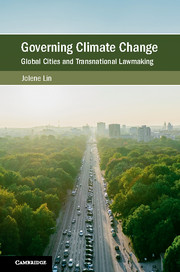Book contents
- Governing Climate Change
- Cambridge Studies on Environment, Energy and Natural Resources Governance
- Governing Climate Change
- Copyright page
- Contents
- Acknowledgements
- Abbreviations
- 1 Global Cities, Climate Change, and Transnational Lawmaking
- 2 Theoretical Framework
- 3 The Rise of the City in International Affairs
- 4 City Action on Climate Change
- 5 Transnational Urban Climate Governance via Networks: The Case of C40
- 6 Cities as Transnational Lawmakers
- 7 A Normative Assessment of Urban Climate Law
- 8 Conclusion
- Select Bibliography
- Index
2 - Theoretical Framework
Published online by Cambridge University Press: 04 June 2018
- Governing Climate Change
- Cambridge Studies on Environment, Energy and Natural Resources Governance
- Governing Climate Change
- Copyright page
- Contents
- Acknowledgements
- Abbreviations
- 1 Global Cities, Climate Change, and Transnational Lawmaking
- 2 Theoretical Framework
- 3 The Rise of the City in International Affairs
- 4 City Action on Climate Change
- 5 Transnational Urban Climate Governance via Networks: The Case of C40
- 6 Cities as Transnational Lawmakers
- 7 A Normative Assessment of Urban Climate Law
- 8 Conclusion
- Select Bibliography
- Index
Summary
INTRODUCTION
In order to generate a richer understanding of the emergence of cities as governors and, more specifically, lawmaking actors in the area of transnational climate change governance, this book adopts an eclectic analytical framework that draws upon diverse theoretical perspectives. Analytical eclecticism proceeds on the basis of a pragmatic ethos. It is said that the researcher who adopts an analytical eclectic approach is searching for middle-range theoretical arguments that potentially speak to concrete issues of policy and practice. In drawing upon diverse theoretical perspectives, this book seeks to guard against excessive simplification that can arise when one tries to apply a single theoretical lens to explain messy real-world situations. In other words, analytical eclecticism invites us to refrain from being ‘intellectually aggressive hedgehogs’ and to embrace the possibilities that open up from drawing upon theories and narratives developed in different research traditions.
This chapter provides the theoretical underpinnings for the book by bringing together theories from various disciplines including political science, law, international relations, and sociology to help frame the participation of cities in transnational climate change governance processes. Transnational regime complex theory provides the framing of transnational climate change governance as a space that is densely populated with many institutions that perform potentially overlapping functions. Cities are emerging within this space as one of multiple governance actors. After introducing the regime complex theory, the chapter moves on to briefly explain the theory of orchestration, which is primarily prescriptive about how the international system ought to manage the disadvantages and maximize the benefits of institutional fragmentation. While regime complex theory tends to emphasize the problems of rule inconsistency and rule conflict that can arise when there are multiple institutions governing an issue area, orchestration theory emphasizes the benefits of institutional multiplicity such as the potential for mutual learning and experimenting with different governance approaches.
Transnational law provides an alternative theoretical framework for analyzing how states and non-state actors are involved in making and implementing law that has effect across national boundaries. Making a shift from a state-centric view of international law is necessary in order to consider the role of sub-state actors such as cities and their local governments in governing climate change at the global level.
- Type
- Chapter
- Information
- Governing Climate ChangeGlobal Cities and Transnational Lawmaking, pp. 21 - 41Publisher: Cambridge University PressPrint publication year: 2018

